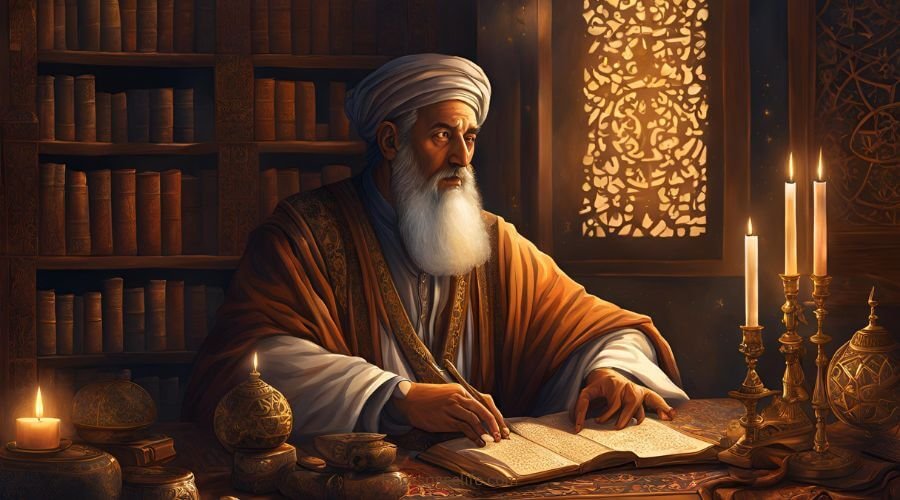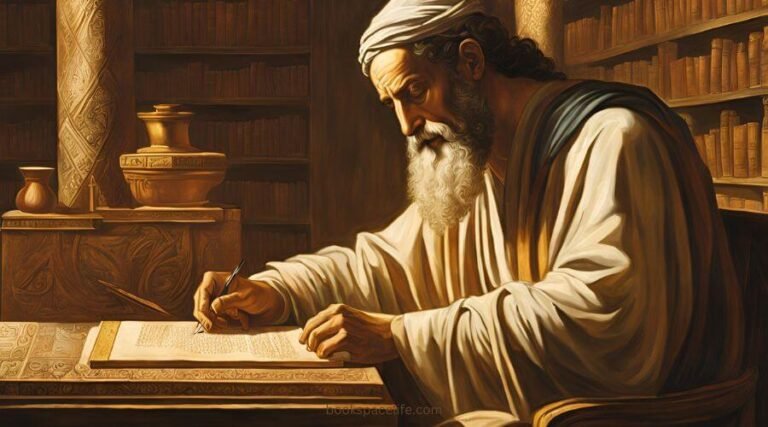Philo of Alexandria
Al-Farghani (Alfraganus): The Eminent Astronomer and Philosopher of the Islamic Golden Age
Abu al-Abbas Ahmad ibn Muhammad al-Farghani (800 – 870 CE), better known in the West as Alfraganus, was one of the leading figures in the field of astronomy during the Islamic Golden Age.
His contributions to science, particularly in the field of astronomy, were highly influential both in the Islamic world and later in medieval Europe.
His work in the 9th century marked an important turning point in the way humans understood the cosmos. Known for his ability to synthesize the astronomical knowledge of his time and present it in a more accessible and practical manner, Al-Farghani became one of the foremost intellectuals of his era.
Table of Contents
(1) Early Life and Education
Al-Farghani was born in Farghana (or Ferghana), an area located in modern-day Uzbekistan, around the 9th century CE.
The region was known for being a cultural and intellectual crossroads, where Persian, Arabic, and Turkic cultures intersected.
This environment undoubtedly influenced Al-Farghani’s development as a scholar. While much of his early life is undocumented, it is known that Al-Farghani received his education in Baghdad, the intellectual hub of the Islamic world at the time.
Baghdad, under the Abbasid Caliphate, was home to the House of Wisdom, an institution dedicated to the translation of classical Greek works and the advancement of scientific and philosophical knowledge.
At this academic center, Al-Farghani studied under renowned scholars of his time, focusing on astronomy, mathematics, and physics.
Baghdad’s environment encouraged scholarly collaboration, and Al-Farghani’s education was supplemented by an exposure to a broad range of classical texts from Greek, Persian, and Indian traditions.
He became well-versed in the astronomical works of Ptolemy and Greek philosophers, integrating these ideas with the expanding body of knowledge in the Islamic world.
Al-Farghani’s background in mathematics and geometry also influenced his later contributions to astronomy, as the accurate calculation of astronomical data was deeply rooted in these disciplines.
(2) Contributions to Astronomy
Al-Farghani’s work was primarily in the field of astronomy, but his contributions extended to related fields, including mathematics and astrophysics.
He is best known for his astronomical treatise, Kitab fi al-Hay’a (The Book of the Elements of Astronomy), which was an important and influential work in the Islamic world and beyond.
In this text, Al-Farghani presented a comprehensive and accessible account of Ptolemaic astronomy, correcting errors in the Almagest (Ptolemy’s seminal astronomical work) and summarizing astronomical knowledge in a way that was usable for both scholars and practitioners.
One of Al-Farghani’s significant achievements was his careful refinement of Ptolemaic theory. While he largely adhered to the Ptolemaic model of a geocentric universe, he made important revisions and improvements, most notably in his understanding of the movement of celestial bodies.
Al-Farghani contributed to the astronomical table (or zij) and corrected Ptolemy’s calculations of the obliquity of the ecliptic, the angle between the plane of the Earth’s orbit and the plane of the celestial equator.
Al-Farghani’s improvements in these calculations allowed for more accurate predictions of planetary positions and contributed to the development of more reliable astronomical tables.
Al-Farghani’s work also extended to the measurement of the Earth’s circumference.
He used the method of triangulation to calculate the Earth’s size, arriving at an estimate that was impressively close to modern measurements.
This was a remarkable feat, given the limitations of the tools and observational methods available at the time.
His understanding of the Earth’s size and the principles of spherical geometry were groundbreaking, setting the stage for later advancements in both geography and astronomy.
(3) Al-Farghani’s Influence on Later Scholars
Al-Farghani’s work had a profound influence on later scholars in both the Islamic world and medieval Europe.
His treatises were translated into Latin in the 12th century, and his ideas were widely disseminated throughout the Renaissance.
The accuracy and precision of his astronomical calculations, particularly those relating to the motion of the planets, helped refine the understanding of Ptolemaic astronomy.
In the Islamic world, Al-Farghani was regarded as an authority on astronomy, and his works were cited by later scholars such as Ibn al-Haytham and Nasir al-Din al-Tusi.
His influence was particularly strong among astronomers who sought to develop more precise and reliable astronomical tables, such as those used for navigation and the Islamic calendar.
His methods were widely adopted in both Persian and Arab astronomy and formed the basis for a number of later works.
In medieval Europe, Al-Farghani’s translations played a crucial role in the revival of classical Greek and Islamic scientific knowledge during the Renaissance.
His influence can be seen in the works of scholars like Roger Bacon and Johannes Kepler, who built upon his refinements of Ptolemaic astronomy. Al-Farghani’s astronomical tables, in particular, became important tools for European astronomers and navigators.
(4) Philosophy and Approach to Science
Al-Farghani’s philosophy was deeply rooted in empiricism and the scientific method, which emphasized observation, experimentation, and mathematical analysis.
While he respected the Ptolemaic system of astronomy, he was not afraid to challenge established ideas when evidence did not support them.
His approach was systematic and mathematical, relying on empirical observation to test hypotheses and refine existing theories.
Al-Farghani’s work exemplified the best of Islamic scientific thought, combining respect for classical knowledge with a drive for original inquiry.
Like many of his contemporaries, he sought to reconcile Greek philosophy and Islamic theology, and while his work was deeply scientific, it was also informed by the spiritual and metaphysical inquiries of his time.
In particular, Al-Farghani’s focus on the natural world as a source of divine wisdom aligns with the broader Islamic philosophical tradition of Falsafa, which sought to understand the workings of the universe as a means of contemplating the divine.
(5) Impact and Legacy
Al-Farghani’s legacy in the fields of astronomy, mathematics, and philosophy cannot be overstated. His ability to synthesize and refine earlier astronomical models laid the groundwork for further advancements in Islamic and European science.
He was a key figure in the transmission of knowledge from the ancient world to the medieval period, and his ideas were instrumental in the eventual development of modern astronomy.
His influence extended far beyond the borders of the Islamic world, as his work became central to the scientific revolution in Europe.
The Renaissance saw a rediscovery of his work through Latin translations, and later scientists like Nicolaus Copernicus and Johannes Kepler built upon the foundation laid by Al-Farghani and other Islamic scholars.
In the Islamic world, Al-Farghani’s work was considered a model of clarity and precision, and his treatises were studied by generations of Muslim scientists and philosophers.
His work was integrated into the development of Islamic astronomy, particularly in the creation of zijes (astronomical tables) and astrological systems, which were used for both scientific and religious purposes, such as determining the times for prayer and fasting.
(6) Conclusion
Al-Farghani, or Alfraganus, was an intellectual giant whose contributions to astronomy, mathematics, and philosophy transcended time and geography.
His systematic approach to science, combined with his empirical observations and mathematical precision, made him a crucial figure in the transmission of ancient knowledge to both the Islamic world and Europe.
Through his works, Al-Farghani helped lay the foundation for the scientific revolution that would emerge centuries later. His legacy as a pioneering scholar of the Islamic Golden Age endures, and his influence continues to resonate in modern scientific thought.








